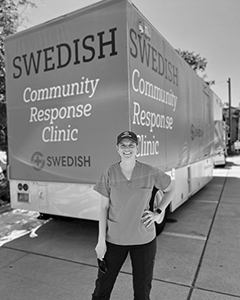In this issue, we talked to Dr. Michele Arnold from Swedish Spine Sports and Musculoskeletal Medicine Center in Seattle, WA. Dr. Arnold volunteered to work in mobile testing units on the streets of Seattle when COVID-19 hit. The following article is based on her experience as of late July 2020.
 Michele Arnold, MD, FAAPMR
Michele Arnold, MD, FAAPMR
Chief Medical Officer
Swedish Issaquah
Swedish Spine Sports and Musculoskeletal Medicine
When COVID-19 hit in March, there were countless changes happening in our institution. When leadership started discussions about various redeployment opportunities, I assumed (having some limited experience with ventilators) I would be in the ICU helping manage ventilator-dependent patients, or that I would be in the hospital. I never expected I would be spending two months on the streets of Seattle serving people in transitional housing and homeless shelters, swabbing patient noses. And yet, it turned out to be the most impactful experience of my 18-year career. For the short-term, I turned in my "physiatrist hat" for a "COVID-19 physician hat," and dove right in.
We developed what are known as Community Response Clinics (CRCs) at several campuses throughout the greater Seattle area. Our set-up included a triage team stationed in a mobile trailer in our parking lot, where people could simply drive up and be screened for COVID-19. The triage team would then radio down to the underground parking garage where we stationed tents and staff for drive-through testing. This worked great for these communities, but we realized we were not reaching our most marginalized and vulnerable populations.
We chose to leave the building and hit the streets. We repurposed a mammogram unit into a mobile testing office, which gave us the chance to go out to at-risk communities. We functioned as a pressure release valve for our emergency departments and this provided a means to offer greater education efforts. A typical day consisted of pre-clinic planning followed by field clinic assembly, clinic operations, and the subsequent tear-down and disinfection. We would then follow-up afterward with results. Over the course of a clinic day, our team of about 15-20 people would typically see about 50-100 patients. Between March and May 2020, we conducted more than a thousand patient screenings with around 700 tests. In the two-month timeframe, we reached 25 different sites throughout the greater Puget Sound area, primarily targeting homeless shelters and transitional housing as well as cultural centers. In hindsight, mobile testing units identified 60% of the COVID-19 positive cases found in our homeless population. None of this would have been possible without our teams.
This is where PM&R truly shines. We work in teams extraordinarily well. We know how to build a team, connect cross-functionally, and keep the power differential low. Whether good or bad, shared suffering brings people together. We experience this on our inpatient rehab units, but I think we miss out on this culture in our clinics. With COVID-19, we ultimately grew more than a team - we grew as a family - bonding with one another around the common resilience to withstand the adverse conditions we were working in. The beauty and the glory of the opportunity far outweighed any of the challenges we faced.
In a normal ambulatory practice, focusing on production expectations and seeing patient after patient can lead to feeling like we're on the treadmill. In the clinic, it is easy to lose sight that we're on a team. My next goal is to recreate that same feeling of camaraderie, that same culture that we were able to develop in the CRCs, and plant that in my own clinic.
My final takeaway that I want to share with you is this: Don't be afraid to look for and lean into opportunities. We're proud of being physiatrists. We love our specialty and will defend it to the ends of the Earth. But we don't know everything. No one in my residency program taught me how to do health screenings for an infectious disease on a busy city sidewalk during a pandemic (that's not a typical rotation in your PM&R residency!). We must be willing and open to meet the challenges of new opportunities that COVID-19 is presenting to us. I am a firm believer in that if you are being called to do something revolutionary, you're going to be equipped.